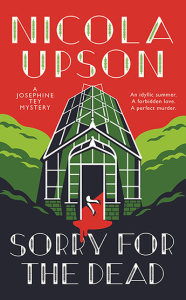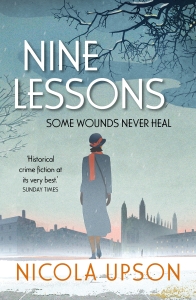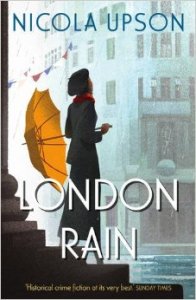Sorry for the Dead – Nicola Upson
 With ‘Sorry for the Dead’, the eighth instalment in the Josephine Tey mystery series, Nicola Upson has, once again, penned a superior historical crime novel. ‘Sorry for the Dead’ is a nuanced, sophisticated psychological thriller which soars above genre conventions as it explores thorny social themes with acute insight and polished prose, while ensnaring readers with a gripping plot that keeps them guessing until the last page.
With ‘Sorry for the Dead’, the eighth instalment in the Josephine Tey mystery series, Nicola Upson has, once again, penned a superior historical crime novel. ‘Sorry for the Dead’ is a nuanced, sophisticated psychological thriller which soars above genre conventions as it explores thorny social themes with acute insight and polished prose, while ensnaring readers with a gripping plot that keeps them guessing until the last page.
As a bonus, the novel’s architecture is both ambitious and intriguing, the narrative shuttling backwards and forwards in time without losing momentum, cleverly concealing its secrets and ending with enough twists to satisfy the most voracious appetite for surprises.
‘Sorry for the Dead’ is also a very smart exercise in how to keep a series fresh and original, a remarkable feat after seven previous Josephine Tey novels. Upson chiefly achieves this by not making Josephine the novel’s only focus, though two of the main themes explored in the novel, women being discriminated against for their sexuality or simply for successfully running a complex business, while they don’t involve Josephine directly, clearly and very painfully echo some of her own concerns.
As a successful playwright and crime author, and because of her sexual preferences, Josephine is well aware of both the overt prejudice and the more sly, covert chauvinism women, not to mention lesbians, had to fight against on a daily basis at the time (the story is set in the first half of the twentieth century, though the world doesn’t seem to have changed much in the intervening sixty-odd years). ‘Sorry for the Dead’ is very much about the struggle independent women faced in making their mark in a male-dominated society, even one as relatively enlightened as early twentieth century Britain.
A struggle which Georgina – George – and Harriet are extremely familiar with. Despite the odds stacked against them, all the more so because of the lesbian relationship they are forced to conceal, they have made a success of Charleston Farmhouse, the horticultural college for girls they run in the Sussex countryside in the first decade of the twentieth century. World War One is raging and the bulk of the nation’s men are tragically caught up with it, so it makes sense for women to be enterprising and try to help feed the country at the same time – by boosting the horticultural skills of its young women and teaching them self-reliance and commitment into the bargain.
George and Harriet are good at what they do and the college is a success, but it is inescapably exposed to ignorance, intolerance and jealousy, despite the support from Brighton’s Moira House school for girls, whose students are sent out for regular summer stints at Charleston. It is an insidious garden of Eden, as young Josephine, barely out of college and far away from her native Inverness, will discover. In summer 1915, she starts working on a teaching secondment at Charleston Farmhouse and befriends resourceful local girl Jeannie, who also teaches at the college. They are kindred spirits, and the heady combination of the Sussex countryside’s beauty, the college’s communitarian spirit and the sheer energy of so many young women thrown together, makes them fall for one another.
But their idyll is overshadowed by disaster: resentment simmers between some of the students and George and Harriet, causing to the latter two to be summoned by the Moira House head teacher, and no sooner they are back from the troubling interview that Dorothy Norwood, the girl who allegedly denounced some unspecified goings on at the college to Moira House, dies in what might or might not be an accident. A tragedy that will spell doom for Charleston Farmhouse and its spirited entrepreneurs, who are forced to flee in disgrace, their desperation heightened by the hatred the locals vent on the college and all it represents.
Upson is at her narrative best in recounting the tale of that tragic summer, weaving into it the aspirations of and the blossoming passion between Josephine and Jeannie, the hard-working defiance of George and Harriet, the naïve enthusiasm of their charges at the college. The novel’s cloth is also made of a darker fabric though, laced with the resentment against George and Harriet – doubly guilty, especially in the locals’ eyes, for being enterprising and lesbians – and with the calamity of the Great War.
Even more cleverly, Upson blends the summer of 1915 narrative with the present day, 1938, when Josephine, a household name on the London theatre scene, is horrified to discover that a Daily Mail journalist is dredging up the memories of Charleston Farmhouse and of Dorothy Norwood’s death, through Dorothy’s sister Betty Banks, now a renowned actress. Josephine fears the mud-slinging that the allegation that Dorothy was murdered will inevitably trigger, the more so as the journalist in question was a Charleston Farmhouse student and a close friend of Betty’s, one who exerted much influence on her, and decides to try to get to the bottom of the story. A dangerous endeavour, as it will also mean rekindling the memories of her relationship with Jeannie, something Josephine is unsure how to confront, and which threatens to upset the balance of her current relationship.
These are only a few of the narrative strands that make up the rich tapestry of ‘Sorry for the Dead’. Social critique, psychological insight, a flair for engaging the reader and sustaining their interest despite the frequent shifts in setting and time, are some of the ingredients that make ‘Sorry for the Dead’ a striking novel and a great read. Above all, I appreciated Upson’s ability for adapting the narrative mood and register, switching from the youthful effervescence of the Charleston Farmhouse days to the sad, sombre atmosphere fostered by the ravages of war. The story brims with intelligence and compassion, enhanced by Upson’s sharp, elegant prose, something to look forward to in future instalments in this remarkable series.





